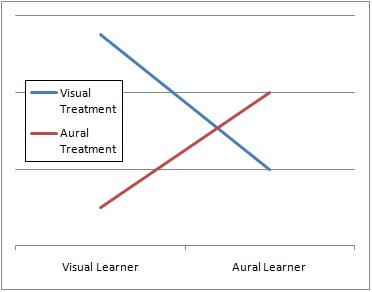Learning Styles Are Meaningless
![]() A recent article in Psychological Science in the Public Interest by Pashler et al.1 concluded, rather boldly, that compelling empirical evidence for the use of learning styles in education simply does not exist. Despite a quite large literature on the topic, few studies utilized a true experimental design, and of those that did, most contradicted the hypothesis that there was any benefit to customizing educational curricula to individual learning styles. Only two studies were even identified that provided empirical support for the use of learning styles, and at least one of these still utilized a flawed design.
A recent article in Psychological Science in the Public Interest by Pashler et al.1 concluded, rather boldly, that compelling empirical evidence for the use of learning styles in education simply does not exist. Despite a quite large literature on the topic, few studies utilized a true experimental design, and of those that did, most contradicted the hypothesis that there was any benefit to customizing educational curricula to individual learning styles. Only two studies were even identified that provided empirical support for the use of learning styles, and at least one of these still utilized a flawed design.
It is quite well documented that learning styles exist. In other words, different people prefer to learn in different ways. Some prefer to learn visually, some aurally, and so on. This empirical literature is quite solid, because it is relatively simple: provide a questionnaire to learners, and you will find that they report different preferences in regards to learning modality. But that, by itself, is not very interesting – instead, the question, as Pashler et al. put it, is one of “style-by-treatment interactions,” which is itself an evolution of Cronbach’s classic “aptitude-by-treatment interaction.”2 Each of these theories posits that individuals vary (in either aptitude or learning style), and educational or training treatments customized to those aptitudes/styles will produce better results for each individual than if a single intervention had been used.

Example of a style-by-treatment interaction.
To further illustrate, consider my oversimplified attempt at an example on the right. In this graph, training performance or learning appears on the vertical axis, learning style appears on the horizontal axis, and treatment appears as different lines. Visual learners will learn more with a visual treatment (e.g. video of lecture) while aural learners will learn more with an aural treatment (e.g. podcast of lecture). This is incredibly intuitively appealing. Pashler et al. suggest that its appeal is driven by the same mechanism that drives the success of the Myers-Briggs personality test, despite a lack of solid empirical evidence – that there is some basic human satisfaction at placing people into categories. They also suggest that general concern from parents that educators treat their children as individuals might be a contributing factor.
But regardless of the intuitive appeal, the evidence simply isn’t there. Cronbach never really found broad support for the idea of aptitude-treatment interactions, so much so that many psychologists consider the continued hunt for them to be a fool’s errand. The same may be true of style-treatment interactions – despite thousands of people talking about learning styles, there is simply insufficient scientific backing to those claims.
Pashler et al. helpfully provide several guidelines for the sorts of studies that are needed to really address this question: carefully controlled true experiments with identical outcome measures for all students. All we need now is for educational and training scientists to actually conduct the research!
- Pashler, H., McDaniel, M., Rohrer, D., & Bjork, R. (2009). Learning Styles: Concepts and Evidence Psychological Science in the Public Interest, 9 (3), 105-119 DOI: 10.1111/j.1539-6053.2009.01038.x [↩]
- Cronbach, L. (1957). The two disciplines of scientific psychology. American Psychologist, 12, 671-684. [↩]
| Previous Post: | Why Are Educational Games All Just Brain Training? |
| Next Post: | Online Degrees Not Worth the Paper They’re Not Printed On? |
Trackbacks and Pingbacks